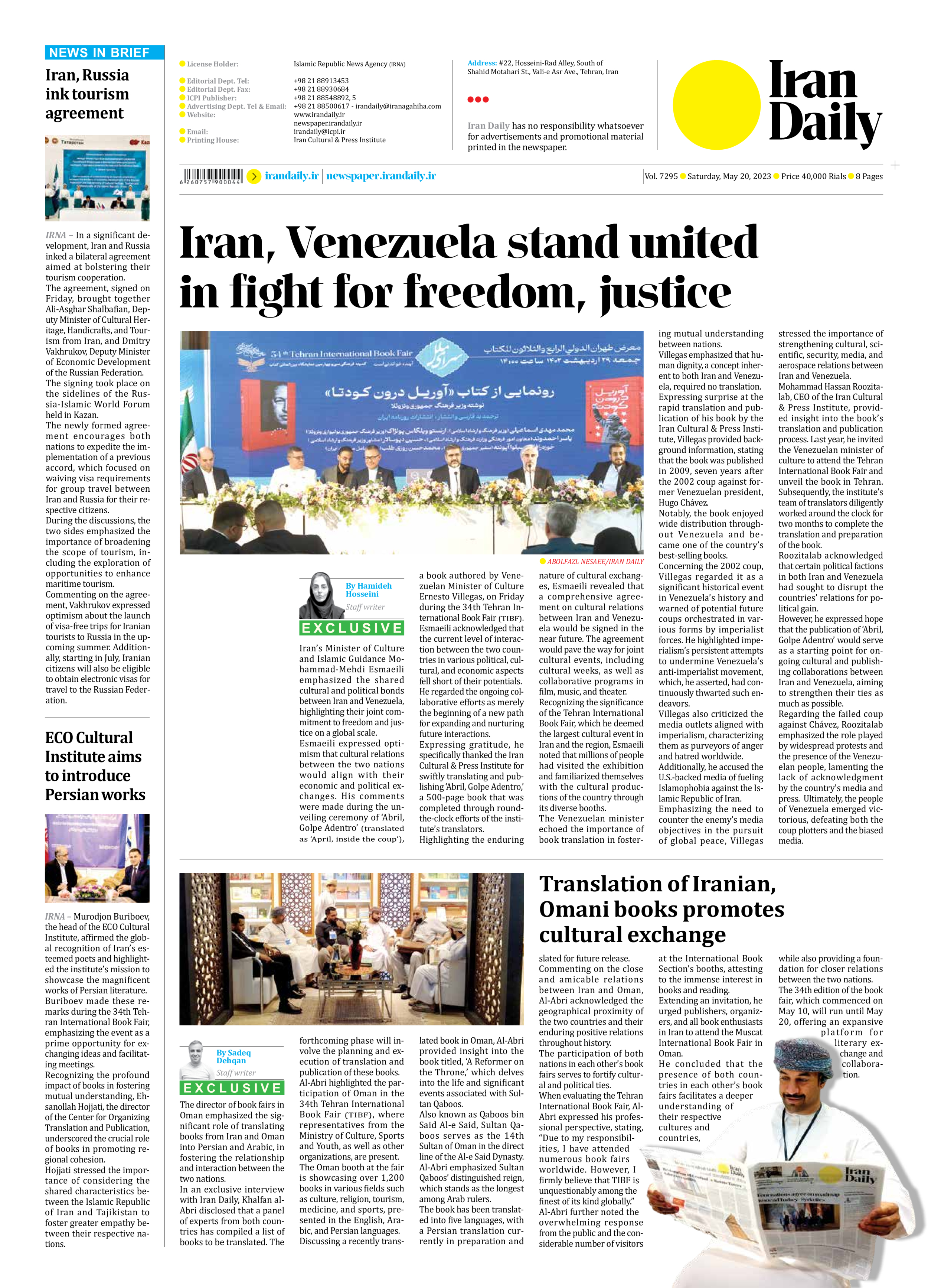
Iran, Venezuela stand united in fight for freedom, justice
By Hamideh Hosseini
Staff writer
Iran’s Minister of Culture and Islamic Guidance Mohammad-Mehdi Esmaeili emphasized the shared cultural and political bonds between Iran and Venezuela, highlighting their joint commitment to freedom and justice on a global scale.
Esmaeili expressed optimism that cultural relations between the two nations would align with their economic and political exchanges. His comments were made during the unveiling ceremony of ‘Abril, Golpe Adentro’ (translated as ‘April, inside the coup’), a book authored by Venezuelan Minister of Culture Ernesto Villegas, on Friday during the 34th Tehran International Book Fair (TIBF).
Esmaeili acknowledged that the current level of interaction between the two countries in various political, cultural, and economic aspects fell short of their potentials.
He regarded the ongoing collaborative efforts as merely the beginning of a new path for expanding and nurturing future interactions.
Expressing gratitude, he specifically thanked the Iran Cultural & Press Institute for swiftly translating and publishing ‘Abril, Golpe Adentro,’ a 500-page book that was completed through round-the-clock efforts of the institute’s translators.
Highlighting the enduring nature of cultural exchanges, Esmaeili revealed that a comprehensive agreement on cultural relations between Iran and Venezuela would be signed in the near future. The agreement would pave the way for joint cultural events, including cultural weeks, as well as collaborative programs in film, music, and theater.
Recognizing the significance of the Tehran International Book Fair, which he deemed the largest cultural event in Iran and the region, Esmaeili noted that millions of people had visited the exhibition and familiarized themselves with the cultural productions of the country through its diverse booths.
The Venezuelan minister echoed the importance of book translation in fostering mutual understanding between nations.
Villegas emphasized that human dignity, a concept inherent to both Iran and Venezuela, required no translation.
Expressing surprise at the rapid translation and publication of his book by the Iran Cultural & Press Institute, Villegas provided background information, stating that the book was published in 2009, seven years after the 2002 coup against former Venezuelan president, Hugo Chávez.
Notably, the book enjoyed wide distribution throughout Venezuela and became one of the country’s best-selling books.
Concerning the 2002 coup, Villegas regarded it as a significant historical event in Venezuela’s history and warned of potential future coups orchestrated in various forms by imperialist forces. He highlighted imperialism’s persistent attempts to undermine Venezuela’s anti-imperialist movement, which, he asserted, had continuously thwarted such endeavors.
Villegas also criticized the media outlets aligned with imperialism, characterizing them as purveyors of anger and hatred worldwide.
Additionally, he accused the U.S.-backed media of fueling Islamophobia against the Islamic Republic of Iran.
Emphasizing the need to counter the enemy’s media objectives in the pursuit of global peace, Villegas stressed the importance of strengthening cultural, scientific, security, media, and aerospace relations between Iran and Venezuela.
Mohammad Hassan Roozitalab, CEO of the Iran Cultural & Press Institute, provided insight into the book’s translation and publication process. Last year, he invited the Venezuelan minister of culture to attend the Tehran International Book Fair and unveil the book in Tehran. Subsequently, the institute’s team of translators diligently worked around the clock for two months to complete the translation and preparation of the book.
Roozitalab acknowledged that certain political factions in both Iran and Venezuela had sought to disrupt the countries’ relations for political gain.
However, he expressed hope that the publication of ‘Abril, Golpe Adentro’ would serve as a starting point for ongoing cultural and publishing collaborations between Iran and Venezuela, aiming to strengthen their ties as much as possible.
Regarding the failed coup against Chávez, Roozitalab emphasized the role played by widespread protests and the presence of the Venezuelan people, lamenting the lack of acknowledgment by the country’s media and press. Ultimately, the people of Venezuela emerged victorious, defeating both the coup plotters and the biased media.







